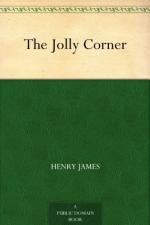“Saved,” though, would it be?—Brydon breathed his wonder till the very impunity of his attitude and the very insistence of his eyes produced, as he felt, a sudden stir which showed the next instant as a deeper portent, while the head raised itself, the betrayal of a braver purpose. The hands, as he looked, began to move, to open; then, as if deciding in a flash, dropped from the face and left it uncovered and presented. Horror, with the sight, had leaped into Brydon’s throat, gasping there in a sound he couldn’t utter; for the bared identity was too hideous as his, and his glare was the passion of his protest. The face, that face, Spencer Brydon’s?—he searched it still, but looking away from it in dismay and denial, falling straight from his height of sublimity. It was unknown, inconceivable, awful, disconnected from any possibility!—He had been “sold,” he inwardly moaned, stalking such game as this: the presence before him was a presence, the horror within him a horror, but the waste of his nights had been only grotesque and the success of his adventure an irony. Such an identity fitted his at no point, made its alternative monstrous. A thousand times yes, as it came upon him nearer now, the face was the face of a stranger. It came upon him nearer now, quite as one of those expanding fantastic images projected by the magic lantern of childhood; for the stranger, whoever he might be, evil, odious, blatant, vulgar, had advanced as for aggression, and he knew himself give ground. Then harder pressed still, sick with the force of his shock, and falling back as under the hot breath and the roused passion of a life larger than his own, a rage of personality before which his own collapsed, he felt the whole vision turn to darkness and his very feet give way. His head went round; he was going; he had gone.




